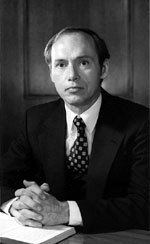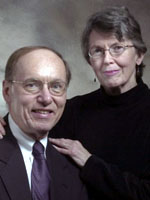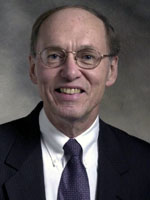 |
Neal Fisher became the second president of the united Garrett-Evangelical Theological Seminary in 1980, when he also posed for this formal portrait.
ALL PHOTOS COURTESY GARRETT-EVANGELICAL THEOLOGICAL SEMINARY |
A colleague and noted author warned me before I accepted the presidency at Garrett-Evangelical Theological Seminary that I should never take the job. His warning was not based on a low opinion of the seminary. Rather, it reflected his conviction that the role of a seminary president was too stressful and demanding to recommend to anyone.
I'm glad I didn't take his advice. Having retired after 21 years as president of Garrett-Evangelical, I can report that the satisfaction far outweighs the stress. In fact, even the times of stress had their rewards. For example, a student delegation met with me early in my tenure to correct my thinking on a matter facing the seminary. They were fairly explicit, as students can be, in explaining why I was wrong on the matter at hand. When the discussion was over, a student (now an able pastor in the Midwest) took me aside and said, "Neal, we hate to do this to you, but that's why we pay you the big bucks!" After his graduation, this student and I kept in contact from time to time, and 21 years later he wrote to me saying that only a pressing family obligation kept him from traveling hundreds of miles to attend my retirement event.
I can report that the satisfactions and rewards are far deeper than the "big bucks" the student assumed went with the job. "Seminary," a term also meaning a "seed bed" or "nursery," offers, as the name implies, an opportunity for planting, cultivation, and growth. As president I had a ringside seat in witnessing able men and women grow from inquiring applicants into committed spiritual leaders.
To me it was exciting each opening week of school to greet an entering class and, with my wife, to host them and their families in our home. During commencement week at the end of the year, it was equally exhilarating to welcome members of the graduating class and their families for breakfast at our home and talk with them about the excitement of their first appointment. I said to one woman who was describing the church to which she was assigned, "You probably have your first sermon in mind by now." She said, "I've already outlined the first ten!" The satisfaction was compounded in years that followed when I visited in their churches or annual conferences and saw former students taking their places as pastors and heard them speak with gratitude about what their seminary professors had meant to them.
A similar reward, I can testify, came from working with faculty members, trustees, and staff colleagues. Garrett-Evangelical, like many other seminaries, has faced in recent years the retirement of many professors who entered the profession in the 1960s and following. The process of recruiting new colleagues gave the seminary additional incentive to be very explicit about our approach to theological education and the core purpose and core values for which we stood.
Often I found it helpful to write a paper and then discuss it with the faculty in regular meetings and retreats. One paper on the seminary's identity and vision of theological education prompted a series of discussions over several months and resulted in a statement that was adopted by 100 percent of a diverse faculty and was followed by a motion to sing the Doxology. Later, when one new faculty member was told that he and newer faculty members might want to suggest changes in the identity and vision statement, he said, "Please don't change it. That's part of what brought me here." Anyone reading this will know that not all matters before the faculty or trustees were resolved with such unanimity or devotion, but the disciplined thinking of the faculty on an issue so central to the seminary was a significant aid in recruiting new faculty.
Institutional balladeer
One writer referred to the seminary president as the institutional balladeer, telling the story of the seminary to all who have a stake in it. I welcomed the challenge of interpreting the seminary to diverse constituencies. At one time I listed between 20 and 30 constituencies with which the seminary needed to be in contact. I also found it stimulating to seek out new allies for the seminary -- those who could serve in leadership as trustees and those who could assist deserving students by financial gifts.
Development officers have sometimes said that fundraising is a series of disappointments interrupted by delightful surprises. It is true that some donor prospects were able to withstand the temptation to give, but it was personally rewarding to work with those who found satisfaction in contributing to something they really believed in. It was not hard to make the case that visionary leadership, humanly speaking, was the most important asset to give to the church of the future. The development office made it a point to introduce student scholarship recipients to the donors who had made their scholarships possible. It was gratifying to observe the development of personal friendships between donors of scholarships and the students who received them.
 |
| Neal Fisher and Ila Alexander met at DePauw University students in the 1950s and married in 1957. In 1989, Ila Fisher earned a master of divinity degree from Garrett-Evangelical and was ordained as a United Methodist minister. |
Mantelpiece reminder
In accepting an appointment as president, I experienced a sense of vocation that was refined and deepened over the years of my service. Believing profoundly in the mission of the church, I came to the seminary seeing it as an opportunity to share in preparing a new generation of spiritual leaders. I increasingly saw my role as that of a servant of a community that was given a lofty calling.
The scriptural text for this form of ministry was selected for me. Across the hearth on the fireplace in the president's office, the words of Jesus at the Last Supper were carved in stone: "I am among you as one who serves" (Luke 22:27b). Every time I entered the office, those words confronted me. In Luke's Gospel they follow the interchange in which Jesus addressed a dispute among the disciples about who was the greatest. Jesus said that the kings of the Gentiles "lord it over them," but that the leader and the greatest among them would be like one who waits on tables. And thus he identified himself.
It was clear that the role of the president was not to "lord it over" anyone but to be a servant of the community and its mission. My friend who advised me was not entirely mistaken. There are in fact stresses in the work, and conflict will take place even in the sanctified realm of a seminary campus. At times a president will receive credit or blame for developments that are not his or her doing. To whatever degree I avoided undue elation over the former or discouragement over the latter, I owe it to a sense of calling to servant leadership. In my best moments, whatever my strengths and weaknesses, I was given some sense of buoyancy and balance by the conviction that I was a servant of a cause that far transcended my momentary comfort or lack of comfort.
I was sustained not only by a sense of calling but by wonderful friends and colleagues who encouraged and sometimes corrected me. For me it was indispensable that my wife shared a sense of calling. Though she was trained as an early childhood educator, she later was called to another form of ministry and completed her M.Div. at Garrett-Evangelical. She was ordained and served as pastor of a United Methodist congregation in Chicago until her retirement because of health considerations. Her partnership in the calling was of immense help.
Mentors and friends
I was blessed by an amazingly resourceful circle of close administrative and faculty colleagues. I could count on their vigorous debate of important issues. I could depend upon them as well to represent the seminary faithfully when together we had arrived at the approach we were going to take. Many faculty and administrative colleagues, contrary to the conventional wisdom, became close friends as well as valued colleagues. A faculty member was commissioned to represent the faculty and travel halfway across the country to participate in the memorial service for my father. An administrative colleague stayed with my family all day when I underwent surgery. Trustees likewise were primary mentors to me. I had the privilege, during 21 years of service, to work with four board chairs. In addition to their commitment as churchmen, they also brought with them a wealth of experience in their professional lives. Together they represented business, manufacturing, advertising, publishing, engineering, and professional athletics. Though they were all scrupulous in observing the difference in roles between a president and a board chair, they were invaluable mentors and friends in talking through challenges and issues facing the seminary. Members of the board were allies who held me accountable and at the same time supported and encouraged me in the effort.
I sent out an informal newsletter every two weeks or so to the trustees with information I felt they needed to know as a part of their trusteeship. I was rewarded by a high level of interest from the trustees and frequent notes or e-mail messages expressing interest and insight.
Addressing controversy
 |
| The Rev. Neal Fisher was associate dean and assistant professor of theology and society at Boston University School of Theology until 1980, when he became president of Garrett-Evangelical Theological Seminary. He retired in 2001. |
This frequent communication served the seminary well in facing controversial issues. The board encouraged direct engagement on the issues. At one meeting they set aside an entire day to discuss homosexuality using a paper I had written and employing outside resource people. There were deep and sometimes contrasting convictions on the matter to be found among trustees, staff, faculty, and students. It will not surprise you to hear that the day did not bring the board to unanimity on the matter, but it did produce deeper understanding of contrasting positions and a commitment to work through the issue with mutuality and Christian charity. During the day I had wondered just a bit how busy people like the trustees would feel about giving a whole day to the discussion. At the end of the day one trustee, the C.E.O. of a major corporation, came to me and said, "It's really good to face these questions directly. I face it all the time in my work, and I value a chance to talk it through in this context." Who would not enjoy working with a circle of people of that mindset and temperament?
Outside the seminary I took advantage of any gathering of presidents and deans to look for ideas and press for solutions that had worked for others. The meetings of United Methodist deans and presidents, the deans and presidents of the greater Chicago area, and periodic gatherings of the Association of Theological Schools gave opportunities for consulting with one another. I also am indebted to selected consultants who contributed insight on the work. I think of a consultant on organizational dynamics who worked with me and our staff, a development consultant, consultants in evaluation and planning, and others as examples of some of those who contributed valuable insights from an outside perspective.
Our seminaries are treasures that in many cases have been tended and supported by generations of those who care about the church. Hundreds of men and women have given their scholarship, their leadership as trustees, their service as custodians and counselors, and their financial contributions so that these seminaries may thrive and fulfill their purpose. To provide leadership for a time in such a place and among such people is an extraordinary opportunity. In spite of my friend's advice, I think I chose well.
A president's resources
As I served as president, I found my own seminary and graduate studies in systematic theology to be a basic resource. I also drew on my service as a pastor, a denominational staff member, and a faculty member and administrator in another seminary.
A number of important publications on theological education appeared in the 1980s and 1990s. These included Edward Farley's Theologia: The Fragmentation and Unity of Theological Education (Fortress, 1983) and his The Fragility of Knowledge: Theological Education in the Church and the University (Fortress, 1988). David Kelsey's To Understand God Truly: What's Theological About a Theological School(Westminster/John Knox, 1992) and Between Athens and Berlin: The Theological Education Debate (Eerdmans, 1993) were excellent additions to the growing body of literature. Christian Identity and Theological Education by John B. Cobb Jr. and Joseph C. Hough Jr. (Scholars Press, 1985) contained stimulating suggestions in thinking through theological education. I also appreciated the regular discussions of seminary education published by the Association of Theological Schools in Theological Education.
Several titles published by the American Council on Education were useful to me on practical matters of academic administration. I particularly appreciated the very practical guidance offered by James Fisher (not a relative) in his Power of the Presidency (Macmillan, 1984) and The Board and the President (Macmillan, 1991).
Like many others in seminary life, I found practical help on the life of learning organizations in the work of Peter Senge, including his The Fifth Discipline: The Art and Practice of the Learning Organization(Doubleday, 1990) and subsequent publications. Helpful analogies for seminary planning were found in the "theory of constraints" outlined in the writings of Eliyahu Goldratt, including The Goal (North River Press, 1992) and It's Not Luck (North River Press, 1994). This was enhanced for me by participation in seminars on the subject sponsored by the Board of Discipleship of the United Methodist Church.